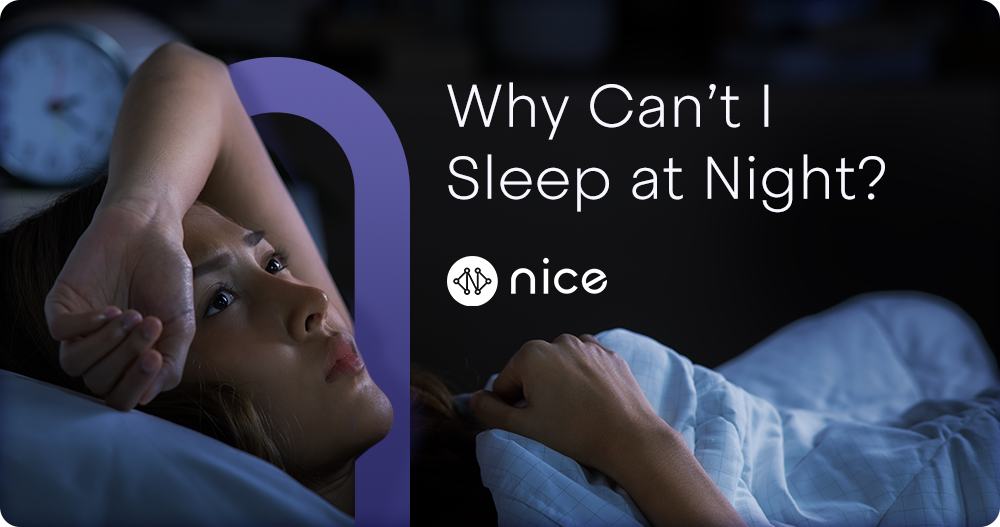Why Can’t I Sleep at Night?
Are you one of nearly 30% of Americans suffering from insomnia, a condition that makes it difficult to fall asleep, stay asleep, or go back to sleep after waking up too early in the morning? It’s a chronic issue for many people, defined as struggling with insomnia three or more times a week, for at least three months.
Whether chronic or occasional, having trouble sleeping at night can be extremely frustrating and negatively affect your daily life–not to mention your health. But some simple, effective strategies can help you get to sleep faster, sleep more deeply throughout the night, and feel more rested and ready to take on the day.
Why Can’t I Sleep at Night?
Your brain and body rest and repair themselves when you sleep. Not getting enough sleep can make it harder to concentrate, think clearly, remember things, and be productive during the day. It can increase your risk of having an accident. Not getting enough sleep can also impact your mood, so you may experience increased relationship stress, depression, or anxiety.
Chronic insomnia can cause serious health issues, including high blood pressure, diabetes, obesity, or even heart disease. So it’s important to start looking at the cause of your insomnia and prioritizing rest.
Some reasons you may be having trouble sleeping are:
Stress. Chronic or even temporary stress can cause tension in your mind and body and make it harder to fall or stay asleep.
Anxiety or depression. Mental health issues can cause or worsen insomnia. And if you’re anxious about not being able to sleep, that can make it even harder to fall or stay asleep.
Sleep habits. You may have trouble sleeping if you often go to bed or wake up at different times, or if you take naps often.
Medications. Certain antidepressants, beta-blockers, cough syrups, allergy medications, or steroids prescribed for asthma can cause sleep problems. Talk to your healthcare provider if you take any of these medications and are having trouble sleeping.
Other health issues. Insomnia can be a sign of underlying health issues, such as sleep apnea, chronic pain, neuropathy, or bladder or prostate issues.
Lifestyle factors. Eating before bedtime, consuming too much caffeine, drinking alcohol, or smoking cigarettes before bed can have a stimulating effect and make it harder to sleep.
What to Do When You’re Having Trouble Sleeping
Practice good sleep hygiene. Sleep hygiene means healthy sleep habits. Healthy sleep habits can help you relax, unwind, and signal to your body and brain that it’s time to rest. Some tips for good sleep hygiene are:
Develop a bedtime routine. Try taking a warm bath or shower, reading a book, or doing some gentle stretches before bedtime.
Limit screen time before bed. Research shows that the blue lights in devices can disrupt our natural sleep patterns.
Turn off all lights and try to limit sounds in the bedroom. You might try a sleep mask, earplugs, or headphones with calming music.
Try to fall asleep in 20-30-minute intervals. If you can’t fall asleep within half an hour, get up and do something calming, such as stretching or reading for a few minutes before trying again.
Reduce stress. Stress can negatively impact every element of your health and interfere with your ability to get enough rest. Whether you’re stressed about work, family issues, or other life challenges, it’s important to learn to cope with stress so you can relax and recharge. Deep breathing techniques and meditation have many positive effects on the brain and can help you clear your mind, fall asleep faster, and soothe anxiety.
Limit caffeinated beverages, especially close to bedtime. Caffeine is a stimulant and can make it harder to fall and stay asleep. Some people are sensitive to caffeine and may need to stick to one cup of coffee or tea in the morning.
Keep a sleep diary. / or Track your sleep habits. Tracking your sleep and lifestyle habits can help you learn what may be causing or worsening your insomnia. This doesn’t have to be extensive, detailed, or perfect. But you might find it helpful to track what time you:
Go to bed
Go to sleep
Wake up
Get out of bed
Take a nap, if relevant
Exercise
Drink alcohol
Consume caffeine
Take medications
Try natural sleep remedies. Over-the-counter supplements such as melatonin, valerian root, or L-Tryptophan can be relaxing and are proven to be safe for most adults. But always check with your healthcare provider before starting any new supplement.
Talk to your healthcare provider. A clinician can run tests to detect or rule out any underlying health conditions that may be causing your insomnia. He or she will also recommend treatments, medications, or lifestyle changes that can help.
Start Getting More Restful Sleep with Nice
Both occasional and chronic insomnia can be frustrating. These strategies may help you uncover the cause of your sleep issues and start getting more rest, feel more energetic, and improve your health and quality of life. But if you’re still struggling to fall or stay asleep, a Nice Healthcare clinician can help.
With in-person and virtual visits, 35 labs, and 550 medications, Nice can help you get to the bottom of your sleep problems, start getting more rest, and take charge of your health–and all at no cost to you.
If you’re an employer who’s interested in offering Nice’s comprehensive primary care services to your employees, learn more by visiting our employer page.

